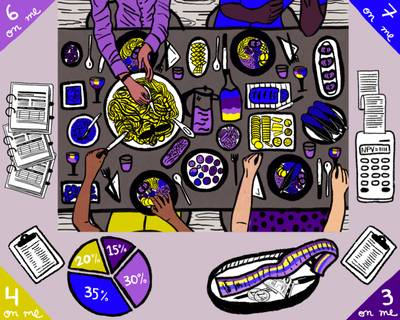

Illustration by Mariana Núñez Sánchez
Muindi Fanuel Muindi is a performance artist, philosopher, and poet, with Lacustrine Bantu roots in the Rift Forests of Eastern Congo and the Mara Wetlands in Tanzania. He is the author of six books of experimental poetry and prose.
Muindi is co-founder of the Fyrthyr Institute for Unsettling Technologies, coordinator of the “Prototyping Social Forms” and “Alter-Eco” research streams at the Synthesis Center, an organizer at the Center for Concrete and Abstract Machines, co-producer and audio engineer for the Forested Niches podcast, and a member of the “After School”, “Technologies of Critical Conscientization”, and “Unwriting Nature” research communities at the Center for Arts, Design + Social Research.
Double-entry or binary accounting prevails over many of our most significant economic relations today at almost every scale of social life.
At the smallest scale, the credits and debits recorded on personal bank statements, credit card statements, student loan statements, mortgage statements, and other accounts of note inform individuals’ credit reports, and these reports determine each individual’s access to the financing necessary to live and plan for the future in a commodified world.
At the largest scale, records of credits and debits on the balance sheets of nation-states inform their sovereign credit ratings, and these ratings determine each nation’s access to the financing necessary to provide social services, to build and maintain social infrastructures, and to undertake social justice initiatives.
Spanning these scales, we find binary accounts assigned to different social entities (individual, institutional, and governmental) being collected and combined into profiles, and we find these profiles being fed to algorithmic systems that record, sort, filter, and, most importantly, rank them. According to the rankings generated by these algorithmic systems, economic opportunities are differentially granted to those entities determined to be creditors and to those indebted entities whom creditors determine to be reliable sources of income; and economic opportunities are denied to those indebted entities whom creditors consider unreliable.
If binary accounting were abolished, we might starve these algorithmic systems and prevent them from functioning as arbiters of access to economic opportunities. Given this, this text calls binary accounting practices into question and wonders at the possibilities for accounting otherwise and adopting non-binary accounting practices.
The practice of non-binary accounting is not new. Friends who “anexactly” rotate covering tabs for food and drink at bars, who do not keep a precise ledger delineating who owes what to whom, are constantly engaging in small-scale non-binary accounting practices. This text wonders whether a more rigorous formalization of the practice of non-binary accounting that is specifically geared towards subverting and dismantling binary accounting practices could be “scaled up”, so that communities and public institutions “splitting the tab” for large scale social initiatives can transact “anexactly”.
This text is split into two parts. The first part, “The Perils of Binary Accounting”, examines the manner in which the binary account operates as a domineering “statement”. The second part, “The Promise of Non-Binary Accounting”, imagines how non-binary accounts could operate as “convivial statements” and coordinate the production, distribution, and consumption of resources on multiple scales without presuming the rigid economic binaries of buyer-seller, consumer-producer, creditor-debtor, employer-employee, landlord-tenant, giver-receiver.
The Perils of Binary Accounting
“All the creditors must appear in the ledger at the right-hand side, and all the debtors at the left. All entries made in the ledger have to be double entries — that is, if you make one creditor, you must make someone a debtor.”
— Luca Bartolomeo de Pacioli, from Summa de arithmetica, geometria, proportioni et proportionalita (Summary of arithmetic, geometry, proportions and proportionality)
A binary (black or white, true or false) system, in which transactions are either credits or debits, events of income or events of expenditure, the double-entry accounting system is a peculiarly abstract writing system with a particular history of violence. Its adoption and refinement by the merchant bankers of the Italian city-states during the Middle Ages was bound up with the consolidation and (mis-)management of the great spoils seized during the carnage of the Crusades and the Christian reconquests. These organized crimes of armed robbery and mass looting formed the basis for the rapid and acute rise in creditor-privileging commercial activity in Europe which, in turn, propelled the European conquest and colonization of the greater part of the planet and the dehumanization of the greater part of the planet’s peoples.
The double-entry or binary account is “statement” of social relations, which is to say, or, in other words, that it is a technology of signification that enables the social categorization and administration of peoples, places, and things. The binary account was a means by which creditor-privileging commercial activity came to make sense, take priority, have reference, and inform human activities. The formalization of binary accounting cannot be credited as being the cause of the rise of colonialism and racial capitalism, but it was, no doubt, “instrumental” to such and, what’s more, the prevalence and widespread adoption of binary accounting cannot be dis-entangled from its facilitation of processes of racialization, colonization, and extraction.
To understand what a “statement” is and what it does, it is useful to distinguish between two kinds of “statements”, domineering statements and convivial statements, and to relate these different kinds of statements to the different kinds of communication that they respectively serve to enable, violent communication and nonviolent communication.
Domineering statements are the means by which forms of violent communication come to make sense, to take precedence, to have reference, and to set processes in motion. Domineering statements are, in other words, the conditions of possibility for the effectiveness of forms of violent communication.
Convivial statements are the means by which forms of nonviolent communication come to make sense, to take precedence, to have reference, and to set processes in motion. Convivial statements are, in other words, the conditions of possibility for the effectiveness of forms of nonviolent communication.
Nonviolent communication is the considerate, honest, and mutual way that people are able to communicate their abilities and their needs to one another. Nonviolent communication enables people to work with one another and to work in accord with the communistic principle, “from each according to their abilities, to each according to their needs.”
Violent communication, by contrast, is the way in which persons in positions of power (or persons seeking such positions) communicate demands and give orders to those whom they compel to work for them. Violent communication disables non-violent communication: it disables the considerate, honest, and mutual communication of abilities and needs amongst people; it enables those in positions of power to disregard others’ needs and to demand that others do more than they are able to such that they do violence to themselves. Violent communication is, in other words, the way in which people in positions of power inspire feelings of impoverishment, indebtedness, ineptitude in those whom they compel to work for them.
Binary accounting is a practice that generates domineering financial statements that guide investment decisions. A binary account is itself a domineering statement but, more profoundly, binary accounts are the raw material for more refined financial statements that are no less domineering: credit reports. Credit reports are domineering financial statements that analyze the data contained in binary accounts regarding the frequency and amplitude of events of income and expenditure in order to evaluate the “creditworthiness” of individuals, corporations, and governments.
Consider the following scenario: a banker processing a loan application says to a loan applicant, “You have bad credit.” This is an instance of violent communication in so far as it obscures the needs and abilities of the loan applicant at whom it is directed while inspiring feelings of ineptitude in that loan applicant. If you were to ask the banker, why would you say such a thing, the banker might say, “It is the truth. Just look at the applicants credit report.”
The loan applicant’s credit report is not a group of sentences, nor is it a group of propositions, nor is it a speech act — the loan applicant’s credit report is a statement. As a statement, the loan applicant’s credit report enables us to discern whether certain sentences (e.g., “You are a have bad credit.”) are correct, whether certain propositions (e.g., “A person with bad credit is one who has a credit score below 600.”) are legitimate, and whether certain speech acts (e.g., “Your loan application is hereby denied.”) fulfill their requirements.
Now, let us consider an act nonviolent communication taken in response to the earlier, act of violent communication: the loan applicant responds to the banker who has deemed him uncreditworthy, “I only have bad credit because I cannot pay my bills, and I cannot pay my bills because I am unemployed and employers discriminate against me because of my race and level of educational attainment. I dropped out of school at an early age to care for my younger siblings and my disabled parent, who has also suffered employment discrimination, and I still support them.” This instance of non-violent communication enables us to discover a few of the needs and abilities that were obscured by the banker’s violent remark. But, alas, this instance of nonviolent communication will have little effect as long as the credit report is the statement that defines the lender-lendee relation.
Indeed, we can see here that the credit report is a domineering statement that primarily serves to enable the creditor to make demands of the debtor, “Pay your bills, or else…” It is not a statement designed to enable the banker to meet their loan applicants needs and discover the full extent of the loan applicant’s abilities. To the contrary, the credit score exists to enable the banker to filter and channel applicants who are likely to “pay up” as ordered in a “timely” manner apart from applicants who are likely to “fall into arrears”, without respecting differing applicant’s differing needs and abilities.
This question that follows from all of the above is, of course, “How might we deconstruct the domineering statement that is the credit report, which primarily enables creditors demand that debtors pay their creditors in a timely manner, and how might we (re-)construct convivial statements that enable debtors to communicate their needs and abilities to one another?”
Rather than regarding a credit report as an evaluation of the ability of an individual, institution, or government to pay, what if we regarded the wretched credit report as an evaluation of the performance of our financial systems and infrastructures, their success and failure at registering the needs and abilities of the individuals, institutions, and governments that rely upon them. Every bad credit report would, then, become an index of systemic and infrastructural failures.
The Promise of Non-Binary Accounting
“[C]redit can only expand by means of debt. But debt is social and credit is asocial. Debt is mutual. Credit runs only one way. But debt runs in every direction, scatters, escapes, seeks refuge. The debtor seeks refuge among other debtors, acquires debt from them, offers debt to them. The place of refuge is the place to which you can only owe more and more because there is no creditor, no payment possible. This refuge, this place of bad debt, is what we call the fugitive public.”
— Fred Moten and Stefano Harney, from “Debt & Study”, The Undercommons
Rather than regarding a credit report as an evaluation of the ability of an individual, institution, or government to pay, what if we regarded the wretched credit report as an evaluation of the performance of our financial systems and infrastructures, their success and failure at registering the needs and abilities of the individuals, institutions, and governments that rely upon them. Every bad credit report would, then, become an index of systemic and infrastructural failures.
Going further, then, we could use the bad credit report to help us determine the reparations owed to individuals, institutions, and governments for having been failed by financial systems and infrastructure. What’s more, we could imagine reparations in this regard being made in the form of time and resources to conduct experiments in non-binary accounting, in the construction of convivial financial statements that would enable individuals, institutions, and governments to better communicate their needs and abilities to one another.
As part of the Fyrthyr Institute for Unsettling Technologies and the Alternative Economies and Ecologies research group at the Synthesis Center at Arizona State University, I have been conducting experiments in constructing convivial financial statements, non-binary accounts, that better communicate their needs and abilities. In these experiments, drawing from the work of the architect Christopher Alexander, we have identified four qualities that enable us to deconstruct binary accounts and create the germs of non-binary accounts These qualities are: not-separateness, deep interlock and ambiguity, roughness, and simplicity and inner calm.
What follows is a description of these four qualities and an abstract machine for a form non-binary accounting that would enable such qualities to effectively emerge.
Our financial infrastructures assume that each individual/institution/government is only responsible for their own finances; caring for one’s neighbor or relations is not built into the financial system as a responsibility. Might we reject the deathly separability of individuals/institutions/governments built into the financial system by making it more and more difficult for financial infrastructures to retrieve, review, and judge financial profiles separately, one-by-one?
Not-Separateness
Consider, if you will, how our present financial systems and infrastructures assign each and every individual/institution/government their own credit report. This individual credit report is retrieved, reviewed, and judged by those who determine whether or not an individual will be given access to credit. In this way, our financial infrastructure is, thus, designed to ease access to credit for some individuals/institutions/governments and to deny ease of access to others — profiling some individuals/institutions/governments as “creditworthy” and others as “uncreditworthy”. In this way, our financial infrastructures assume that each individual/institution/government is only responsible for their own finances; caring for one’s neighbor or relations is not built into the financial system as a responsibility. Might we reject the deathly separability of individuals/institutions/governments built into the financial system by making it more and more difficult for financial infrastructures to retrieve, review, and judge financial profiles separately, one-by-one?
Similarly, non-binary accounts should not count determinate financial periods (e.g., working hours, bi-weekly pay periods, monthly billing cycles, fiscal years, etc.) separately from their neighboring financial periods.
At present, as a contract worker or wage-worker, you have to clock in your working hours during every bi-weekly pay period, and as a debtor and a renter, you have to make your monthly debt servicing payments and rent payments. To make ends meet, you need to clock in a set minimum number of working hours over the course of a set of bi-weekly pay periods to keep up with your monthly debt servicing payments and rental payments. If you do not clock-in the set minimum working hours and you fall behind on your monthly payments, you will be charged compounding late fees that you will have to pay in addition to paying your standard monthly payments.
Our binary accounting practices serve to enable creditors to identify whether and when you “fall behind” on your payments — in other words, all of this serves to ensure that creditors can “objectively” measure out how “uncreditworthy” you are relative to those who have managed to keep up with their payments or make their payments ahead of time. In this way, our financial infrastructures “objectively” discriminate against those who earn less and earn slowly and they grant privileges to those who earn more and earn quickly. Discrete periodizations of credits and debits serve to encourage individuals/institutions/governments to “out-earn” each other, kicking up dust as they out-pace and leave others behind.
Non-binary accounting must reject the deathly encouragement to “out-earn” built into our current binary accounting system by making it more and more difficult for creditors to count determinate financial periods separately, one-by-one.
Deep Interlock and Ambiguity
Going even further, imagine if we could replace credit reports belonging to determinate individuals/institutions/governmentswith regional credit reports that indeterminately belong to several neighboring individuals/institutions/governments. Individualistic selfishness would be discouraged as a result and, instead, we would be encouraged to find the willingness and the ability to care for our neighbors’ earnings.
Similarly, imagine if billing cycles, pay periods, and working hours could not be specified and counted separately from one another — with the result being that powers could no longer pinpoint with certainty whether and when anyone has “fallen behind” on their payments.
Roughness
What if regional financial profiles did not enable creditors to pinpoint the average financial profile of a group of neighboring individuals/institutions/governments? Instead, imagine that these regional financial profiles spanned the range of the financial profiles of neighboring individuals/institutions/governments without ever enabling powers to pinpoint the average or “central tendency” that characterizes the range. In this way, creditors would not be able count on neighboring individuals/institutions/governments having an average financial profile; powers would only be able to count on there being a range of financial profiles amongst neighboring individuals/institutions/governments.
Similarly, imagine if transitional financial periods did not enable creditors to pinpoint the average time that it takes for a set of neighboring individuals/institutions/governments to earn enough credits to make their next payment. Instead, these transitional financial periods could span the range of times that it takes a set of neighboring individuals/institutions/governments to earn enough credits to make a payment without ever enabling creditors to pinpoint an average or “central tendency” that characterizes the range. In this way, creditors would not be able count on neighboring financial periods having an average rate-of-payment; creditors would only be able to count on there being a range of rates-of-payment amongst neighboring financial periods.
Simplicity and Inner-Calm
Could we (i) prevent creditors from ever identifying determinate individuals/institutions/governments who have outlying financial profiles relative to neighboring individuals/institutions/governments and, in so doing, (ii) prevent creditors from subjecting outlying individuals/institutions/governments to special administration and supervision. This is to say, in other words, that creditors should never be given the ability to identify unusually fast earners and unusually slow earners and to place them in separate special/specialized financing programs that privilege fast earners and stigmatize slow earners (or vice versa). Rather, creditors should only ever be given the ability to expand access to general financing, making it more inclusive and less discriminating.
Similarly, could we (i) to prevent creditors from ever identifying financial periods with outlying rates-of-payment relative to their neighboring periods and, in so doing, (ii) to prevent creditors from subjecting individuals/institutions/governments to special administration and supervision during outlying financial periods. This is to say, in other words, that creditors should never be given the ability to identify unusually fast earning periods and unusually slow earning periods and to optimize rates-of-payment during these outlying periods by subjecting individuals/institutions/governments to special administration and supervision during these periods. Rather, creditors should only ever be given the ability to accommodate an ever widening range of rates-of-payment generally, across different financial periods.
An Abstract Machine for Non-Binary Accounting
Definitions
- Absolute Equality: I paid one dollar; you also paid one dollar.
- Proportional Equity, Version 1 (Relative to Income): My payment was equal to one percent of my income; your payment was equal to one percent of your income.
- Proportional Equity, Version 2 (Relative to Assets): My payment was equal to one percent of my asset holdings; your payment was equal to one percent of your asset holdings.
- Proportional Equity, Version 3 (Relative to Consumption): I consumed 75 percent of the resource and I paid for 75% of the resource; you consumed 25% of the resource and you paid for 25% of the resource.
- Degree of Intimacy: Score how intimate you are with the other on a scale of 0 to 10. For a two party relationship, each party privately determines intimacy score for the relationship, and the two individually determined scores are multiplied, producing a score between 0 and 100.
- An intimacy score of 0 indicates what’s mine is mine and what’s yours is yours.
- An intimacy score of 100 indicates everything I have is yours and everything you have is mine.
Operations
- The higher the degree of intimacy, the higher the degree of indeterminacy (e.g., if the degree of intimacy score is 90, there is a 90% chance you will refrain from calculating who has credit and who is in debt; if the degree of intimacy score is 10, there is a 10% chance you will refrain from calculating who has credit and who is in debt).
- If, by chance, you need to calculate who has credit and who is in debt:
- IF your payment = absolute equality AND your payment = proportional equity
THEN arguably, you are reconciled (no credit, no debt) - IF your payment < absolute equality AND your payment < proportional equity
THEN arguably you are in debt - IF your payment > absolute equality AND your payment > proportional equity
THEN arguably you have credit - IF your payment > absolute equality AND your payment < proportional equity
THEN arguably you have credit AND arguably you are in debt - IF your payment < absolute equality AND your payment > proportional equity
THEN arguably you have credit AND arguably you are in debt
- IF your payment = absolute equality AND your payment = proportional equity
- The amount of credit or debt that one has is never calculated precisely. Instead of a precise amount, one is always presented with a range of values. For instance, if you calculate that you would need to pay out $5 to reach absolute equality and to be paid $3 to reach proportional equity, your account would read: arguably, you are in debt AND arguably, you have credit (-5 dollars +3 dollars)






